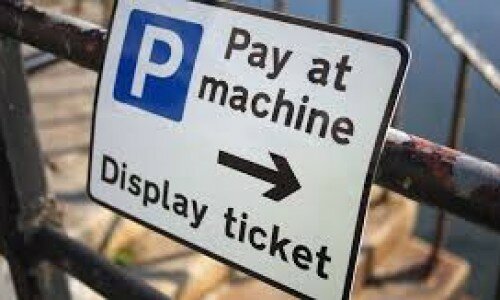
Why should Milton Keynes’ parking charge surpluses be bigger than Birmingham’s?
In the week when annual parking returns provide the basis for some colourful tabloid headlines, Chris Game looks at the local political balancing act involved in car parking and parking charge policies.
There’s an educational app called Shake-a-Phrase, which involves creating usually daft but grammatically feasible sentences out of random phrases, and hopefully thereby extending both children’s vocabulary and their grasp of grammar.
I’ve sometimes wondered, at this festive time of year, if I could add to the app’s animals, fairy tales, and monsters themes with an adult adaptation that I’d call Parking Pirates and Profiteers.
It’s just a business entrepreneur I’m lacking (any interest, ed.?), for I’ve collected a drawerful of necessary phrases straight from the popular media, which I’ll combine here into illustrative Shake-a-Phrase sentences.
“ parking profits” have “rocketed again this year”, as they “milked their cash cow” and ” in “heavy-handed fines and penalties” from “hard-working motorists”, while “killing high streets up and down the land”.
Westminster Council alone “fleeced already hard-up motorists” of £73 million profits through this “stealth tax” – that’s £200,000 per day, or enough to “repair 3,600 potholes every 24 hours”.
So that’s the idea, and there’s plenty more, including the that Birmingham City councillors are accused of pursuing, and of course the ubiquitous “victimised elderly lady” fined by some techno parking company for her registration plate.
To emphasise, though, all these proposed Shake-a-Phrases are taken from actual quotes and most have appeared on cue again this week.
This week because late November is when the estimable transport consultant, David Liebling, produces for the (who for some reason repeatedly misspell his name) his annual analysis of councils’ official parking returns to the Department for Communities and Local Government (DCLG).
His, and the RAC’s, phraseology is less shouty than that of the tabloid press. So it’s generally ‘surpluses’ from councils’ parking operations, rather than the more emotive ‘profits’, that have risen – in 2016/17 to indeed a record £819 million from a total parking income of £1.6 billion.
The RAC also emphasises what it calls “the silver lining for drivers” – that these surpluses must almost exclusively be ploughed back into transport projects, such as road repairs, creating new parking spaces, and subsidising bus travel.
It was this dimension of parking charges that used to fascinate me long before I thought up my Shake-a-Phrase app.
So much in our hyper-centralised governmental system that ought to be the business of locally elected and accountable councillors – not least almost all financial discretion – has been appropriated by ministers and central government civil servants.
But parking policy – and, indeed, charging more generally – is one of the ultimately local issues, demanding approaches that differ between councils and even within them, to which district and ward councillors should be able to contribute both their constituents’ and their personal views and priorities.
The City Council’s usefully illustrates how diverse these can be, and contextualises the near-impossible transport policy balancing act required of a city the size of Birmingham.
On the one hand is its primary legal duty of ensuring “the expeditious movement of traffic”. On the other – somehow to be accommodated in those annual DCLG parking returns – are the competing calls for effective loading areas for businesses, provision for those with disabilities, more sustainable and environmentally friendly modes of travel, improved road safety, a vitalised city centre without detracting from local centres – oh yes, and are we or aren’t we attempting to produce a surplus?
One feature of the media coverage of the DCLG returns, which understandably focuses first on the councils with the biggest parking charge surpluses, is that those reporting losses – 44 this year, half of which were of at least six figures – are almost completely ignored.
It’s one of many examples of how councils lose out, no matter what they do. Return a healthy surplus, and they’re accused of fleecing the motorist. Return a loss, and they’re lousy budgeters, incompetent collectors, and/or they’re fleecing council tax payers.
It’s impossible, simply from the figures, to know which, but at least my table includes a selection of West Midlands loss-makers: three boroughs who recorded losses in 2012/13, but surpluses in most or all years since, plus North Warwickshire, who apparently, like quite a number of counties and districts, either budget for or are prepared to accept an annual parking charge loss.
Needless to say, Birmingham is not in this position. It clearly has parking and parking charge policies, not least of which would appear to be to budget each year for a worthwhile surplus.
Moreover, bearing in mind the Council’s publicised budgetary difficulties in other areas, its record here seems almost tediously stable and efficient – returning in each of the past five years a steady and steadily increasing surplus.
It would naturally be interesting to learn more about where last year’s £11 million went and who were the main beneficiaries, but my question here is simpler.
In each of those five years Birmingham (budget: £3 billion+) has ranked alongside but mostly fractionally adrift of Milton Keynes (budget: £430 million). If we’re in the Parking Profiteering business, could or should ours be a bit bigger than at least that of Milton Keynes?
Similar Articles
PM: gave unlawful advice; frustrated Parliament
"Scenes." As young people would say, writes Kevin Johnson. "Unlawful." "Unequivocal." "Historical." These words are not,
WMCA: Nothing to see here…move along
As the Prime Minister prepared to address leaders ‘up North’ gathering for the Convention of
HS2: new driver needed
Is the Oakervee Review "welcome", "frustrating" or the end of the line for HS2, asks
Dawn goes Down Under
It might appear that Birmingham city council changes its chief executives more regularly than its
Who can beat the Street?
You could be forgiven for not realising we are in the foothills of the very










